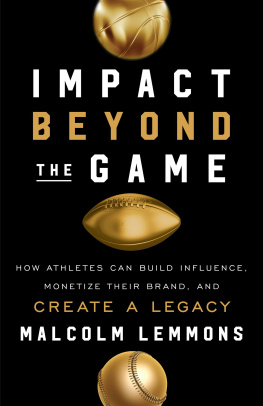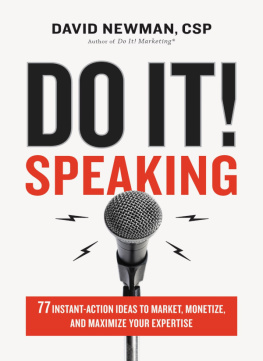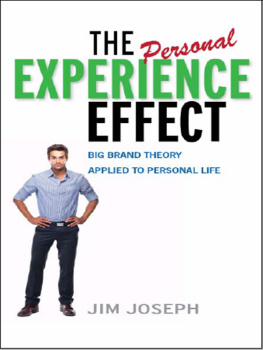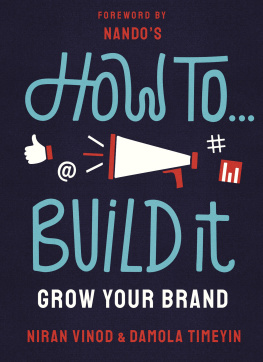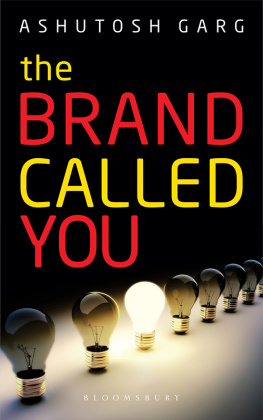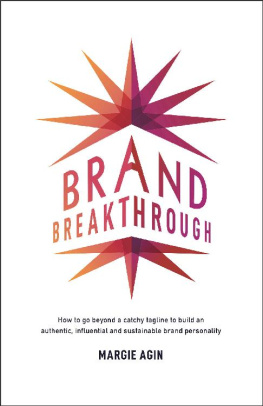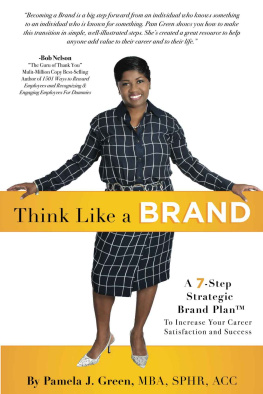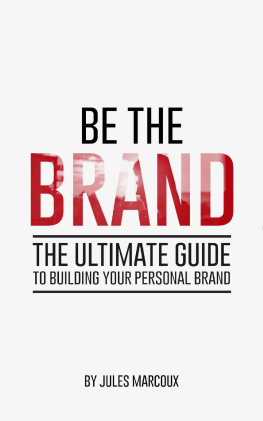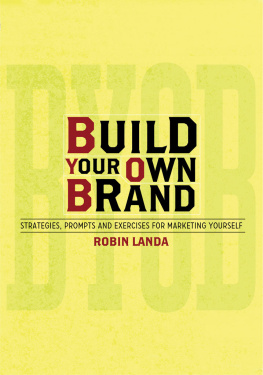All rights reserved.
This book is dedicated to Kobe Bryant, his daughter Gianna and the seven other passengers who tragically lost their lives January 26th, 2020. Thank you Kobe for showing kids around the world what it means to leave a legacy and make an impact beyond the game.
Introduction
Building my personal brand was something that I never thought about during my athletic career. Honestly, I dont even think I knew what a personal brand was when I was competitively playing basketball, let alone think I had one of my own. I quickly found out that the joke was on me as I began to make the transition into life after sports. It turns out this idea of having or developing a personal brand was something that was already being done for me without me even knowing it. It was something that was evolving and growing on its own, even though the only thing that I had ever focused on was becoming a better basketball player. It also turns out that every single athlete (yes you too) on this planet has one and if they arent controlling it, then something or someone else is. It became more clear to me that if athletes dont control their own narrative and story, other people or the media will control it for them, dictating the perception that people have of that athlete. That can be a scary thing to think about, right? But its the truth. And moreover, its something I wish I had realized earlier in my playing career. Plus, I know for a fact that Im not the only athlete who has said something like this before.
When I look back at the end of my athletic career, taking control of my personal brand was by far the most important thing that helped me transition effectively into life after sports, because it allowed me to see who I was outside of being an athlete, while also allowing other people to get to know my story as well. Over the past several years, Ive watched so many of my former teammates and other athletes struggle to transition into life after sports. Many of them seemed like they were more than equipped and intelligent enough to make the transition, but when it came to disassociating themselves from being an athlete, they just couldnt seem to get past it. Being an athlete was all they knew. They had only tapped into the athlete side of who they were, never acknowledging the entire individual. They had no idea what else they could bring to the table or offer to the world. Without the ball in their handsthey essentially felt like a nobody.
But when you begin to take command of your personal brand, it forces you to figure this out. Crafting your personal brand helps you to establish a stronger identity of who you are deep down inside. It propels you to focus not only on what you can do or offer to the world, but also why youre the athlete or individual who can offer it. Its one of the only times when I can put a guarantee behind the saying, If you build it, they will come.
Building a personal brand as an athlete still includes considering your athletic side, dont get it twisted. But believe me when I say that its also a lot more than that. Building your personal brand gives you the ability to dive into your other interests, capabilities, and passions even if youre not sure what they are yet. It forces you to think outside of your physical capacity and discover the potential you have outside of the game you play.
It also shows people that youre not one - dimensional and releases you from the box that so many people try to put athletes in. Building a personal brand is about inserting yourself into the conversation in your own unique way and telling your story in the way you want to tell it. It shows that you are capable of so much more and that you are more than just an athlete.
What happens when athletes really take the time to build a brand for themselves?
- They influence more.
- They earn more.
- They win more.
With all this being saidyou still might be wondering what the exact definition of a personal brand is. Well, to sum it all up, your personal brand is defined as your reputation, or how people perceive you. It is how people react to you and the emotions they have when they think of your name. It is not only who you are and what your story is, but it is also about what you value, what you stand for, and the things that you firmly believe in. Its how you dress, the way you talk, and the way you interact with others. It is essentially everything that makes you, you. For every athlete out there, this means not only who you are on the playing field, but more importantly, off the playing field as well. A brand incorporates how people feel about you as an athlete, but also their impression of you as a person in society.
The term personal brand became mainstream in the late 90s when it was highlighted by Tom Peters in an article for Fast Company magazine. He starts out the article by writing:
Regardless of age, regardless of position, regardless of the business we happen to be in, all of us need to understand the importance of branding. We are CEOs of our own companies: Me Inc. To be in business today, our most important job is to be head marketer for the brand called You.
Of course this concept of personal branding had been around long before this quote, especially for athletes and celebrities, but its been amplified and put under a microscope in recent years due to social media, the emergence of digital marketing, and social advertising. Its what we call a buzzword in the marketing and branding world. If you think about some of the most notable athletes in the history of sportscompanies have always leveraged the relevance of these athletes to push and promote their products.
Michael Jordan is probably the most illustrious athlete who has become a huge cultural symbol, both on and off the playing field. But even before Michael Jordan, there was a baseball player by the name of Babe Ruth, who is credited for endorsing underwear and chocolate candy during his baseball career with the New York Yankees during the 1930s and 40s. Michael Jordan, however, took celebrity and athlete marketing to another level. He generated millions of fans, followers, and dollars (even before social media) not only through his basketball talent, but also with his personality and charisma. He completely changed the game for athlete branding. At the height of his basketball prowess, everyone wanted to be Like Mike igniting a Nike slogan which is still impactful and recognizable today.
Through his sponsorship dealsmainly with McDonalds, Gatorade, and NikeMichael Jordan, along with his agent David Falk, proved to everyone that an athletes value is worth more than what we see on the court or field. Aligning himself with David Falk, who is the genius behind the Air Jordan name, Jordan was able to tie himself to big name brands and companies which naturally led consumers to be enticed by these brands.
As according to plan, consumers began to buy more from these companies solely because of this association. Buyers were not only seeing Jordan on the court, they now began to see him on TV commercials, billboards, and hear him through the radio. The emotional connection, respect, and admiration that people had with and for Michael Jordan, directly transferred to the brands that he endorsed, which elevated both his profile and turned major profits for these companies. As a result, the Jordan brand is a billion - dollar entity that still drives our culture today.

